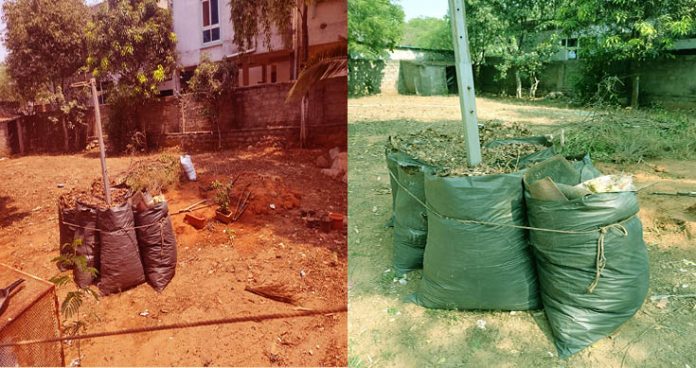At a time when the garbage collection in city and surrounding areas turns a litmus test for GHMC, awareness about the importance of using green waste being generated in colonies gained prominence that would by and large help people to promote nurseries in their own colonies and the GHMC to tackle the stinking issue of trash collection every day.
Unlike the city, the suburban areas like Rajendranagar, Bandlaguda and Jalpally generate an exceptional amount of garbage together with green waste every day that if used miraculously can produce good amounts of rich compost to help raise nurseries and roof gardens in the colonies and in backyards. Much of these areas are having enough open spaces to carry out rotting activities that may help colony residents enjoy an eco-friendly environment without taking much pain in dealing with stinking garbage and pollution issues.
ALSO READ: Garbage bank opened in Varanasi, to fill people’s pockets with money
For example, Rajendranagar circle on the city outskirts alone generates 300 metric tons of garbage every day that carries large amounts of green waste as this part of the city has a myriad number of trees and plants of all sizes straight on countryside in homes and backyards.
“With a total 80,000 households in the circle this area generates a whopping 300 metric tonnes of garbage everyday through door to door collection. There are around 800 sanitary workers with 100 tippers and approximately 90 autos to cart away the trash every day to Jawahar Nagar Dump Yard. This falstaffian task could be averted if the open spaces in the colonies here could be used to promote compost yards,” argued Anjaneulu, Sanitary Inspector, GHMC, Rajendranagar Circle.
Every day, he said, the exceptional amount of green waste extricated from different types of trees in the residential colonies which if meticulously used could produce good amounts of compost and organic manure helpful to promote nurseries and maintain an eco-friendly environment together with revenue generation.
“Residential areas on the outskirts like Shastripuram colony, where enough open spaces with different types of trees are available, could be useful to boost the idea of ‘green waste to wealth’ concept. Few open plots could be promoted as compost yards could help in raising beautiful nurseries thereby extending green cover with biodiversity in the city suburb,” he asserted.
Reinforcing the discussion the agricultural experts say that the green waste generated from colonies could be used to promote backyard gardens and nurseries within the residential area.
“Open areas in mega cities such as Hyderabad are either vanishing or shrinking with space. Out of 4,500 metric tonnes of waste produced in Hyderabad per day, atleast 50 percent is compostable. This can be used to compost and produce food locally. Food production requires land and land requires soil. This soil requires manure or compost to make it living. Due to shrinking space, the urban residents are now resorting to composting to their wet waste in pots for plants. The organic waste can be composted to enrich the soil, in order to produce vegetables and fruits and also create a micro-climate for trees and shrubs, which are essentially required for afforestation. As such open spaces and open lands are required for composting in urban spaces where apartments dominate the horizon,” argued Agri Specialist Narsimha Reddy.
ALSO READ: Dumping of garbage and construction debris go haywire at Mir Alam Lake
We have appropriate remediation mechanisms to stinking garbage menace, but we aren’t taking sincere enough steps to heed to those ideas. People are inherently inclined towards nature, but resist to invest themselves in causes associated with betterment of our natural ecosystem. For instance, by transforming organic waste into organic wealth, we all can escape the detrimental effects of waste, and benefit from its organic yield. Such an effort if rightly invested can produce amiable results for everyone. This idea can also be replicated beyond Shastripuram Colony in the long run,’ argued M.A.H. Asif, a resident of Shastripuram Colony who spearheads the moment against the illegal plastic industries in the residential colony.







